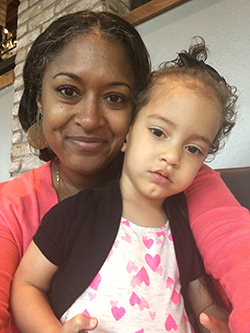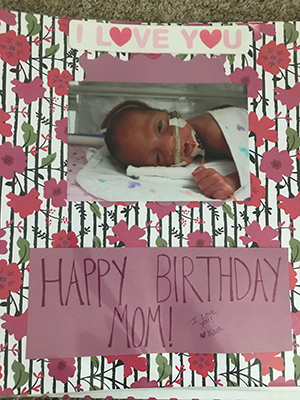Jacqui's Story
How one mom met, and conquered, her breastfeeding challenges.
 Just about everything Jacqui Lindsey hoped for when she was expecting her first baby didn’t happen the way she planned.
Just about everything Jacqui Lindsey hoped for when she was expecting her first baby didn’t happen the way she planned.
Especially the breastfeeding part.
As a Social Work Supervisor for UR Medicine’s Baby Love program, Jacqui leads a team of community health workers who give pregnant women and new mothers information and support, including breastfeeding advice.
So when she found out she was pregnant at 33, Jacqui knew she wanted to breastfeed. "My sister Elizabeth breastfed both my nieces," she said. "It wasn’t a tough decision to make."
Everything was going well with the pregnancy, Jacqui remembered. But at 24 weeks and 3 days, her water broke. She spent 16 days on bed rest in Strong Memorial Hospital before her daughter, Kaia, was born. Kaia weighed only 2 1/2 pounds and went to the Golisano Children’s Hospital Neonatal Intensive Care Unit for care.
Jacqui’s first breastfeeding goal—to participate in "skin to skin" contact with her newborn and breastfeed immediately—ended right there.
"I didn’t get to see Kaia for three hours after I had her, and didn’t get to hold her until she was five days old," Jacqui said.
Breastfeeding was also a challenge. It’s common for moms of preemies to have little or no milk supply at birth. Jacqui started hand-expressing milk, then pumping, but the milk wasn’t coming in quantity. She consulted with Dr. Casey Rosen-Carole, Director of UR Medicine’s Lactation Medicine program, who ordered blood work and an ultrasound to check for causes of low milk supply. Dr. Rosen-Carole then started Jacqui on supplements and used a strategy for Jacqui to "power pump"—increasing the frequency of pumping to trigger hormones that would boost Jacqui’s milk production.
Jacqui and her husband, Bryan, spent all-day sessions at the NICU with Kaia that were tiring and stressful: Kaia had serious complications, including bleeding in her brain that they feared would lead to hydrocephalus, or abnormal and rapid swelling of the skull. If the bleeding continued, Kaia was in danger of neurological damage. Doctors were weighing whether the tiny newborn needed brain surgery.
Despite the stresses, Jacqui’s breast milk was improving slightly.
Then, another surprise: Six weeks after her delivery, and despite the first tests for this coming back negative, Jacqui learned that a bit of placenta from Kaia’s birth was still in her uterus, "tricking" her body into thinking it was still pregnant. When it was removed, Jacqui’s milk supply increased quickly—so quickly, it was difficult to manage. Jacqui went from too little milk to too much, in rapid succession, and her breasts were painfully engorged. Again, it was time for Lactation Medicine to help.
Jacqui pumped at Kaia’s bedside in the NICU and started to breastfeed; the staff would feed Kaia the breastmilk by bottle if Jacqui needed to go home. When Kaia was released, Jacqui was able to breastfeed her at home, but had to return to work after four weeks. She pumped at work, and nursed her baby in the evening. The bleeding in Kaia’s brain resolved without the need for surgery, and left no lasting health concerns. Today, Kaia is a happy, healthy 2-1/2-year-old.
 Nothing went according to Jacqui’s plan—but through her own determination and the support of her husband and others around her, Jacqui achieved her goal to breastfeed her baby.
Nothing went according to Jacqui’s plan—but through her own determination and the support of her husband and others around her, Jacqui achieved her goal to breastfeed her baby.
"When I wasn’t producing milk—that’s an easy time for someone to give up," she remembers. "Dr. Rosen-Carole would come to the NICU and talk to me and encourage me. She and Donna Barrows, a Lactation Consultant at Strong, were big supporters."
"And the staff in the NICU—they were wonderful. They made a birthday card for me ‘from Kaia’. They took pictures of Kaia breastfeeding for the first time in the NICU. They would save her bottles for me and write down how much milk she drank at her feeding."
And through her struggles, Jacqui thought of the women in her life who were role models, like her sister, as well as the women in Baby Love she was working to support. "Working with pregnant women, I knew about the benefits of breastfeeding, and I was sharing that with them. Those messages of encouragement ended up helping me when I needed them."